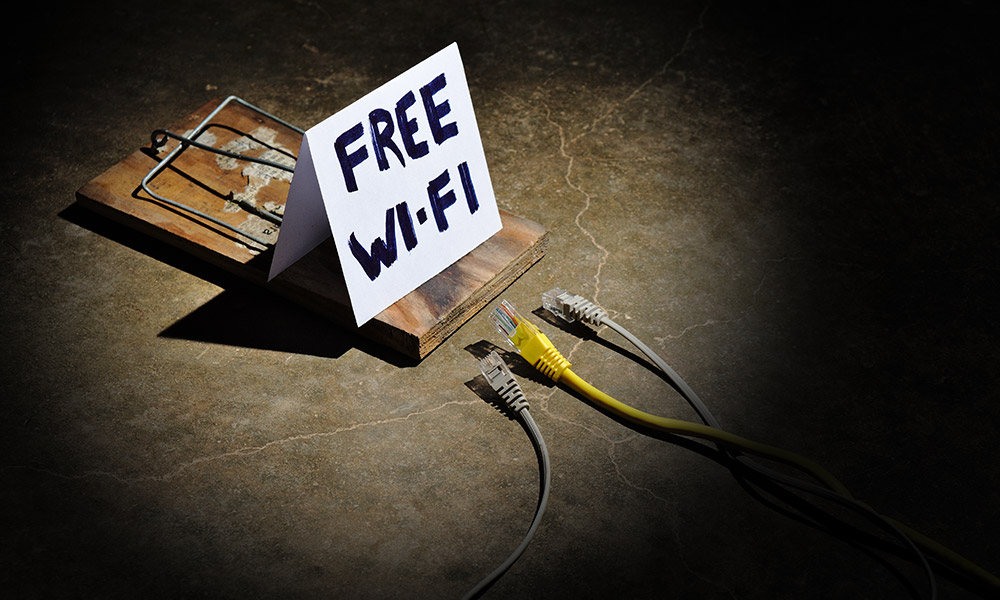Immediate access to good WiFi in your static caravan or lodge on a holiday park is the expected norm. However, as a WiFi user, there are a number of factors to consider, specifically in relation to online security and safety.
In many situations a holiday park will provide free WiFi for its residents – but how can you be sure by logging into it that your information is kept confidential and safe? Like most public networks, it may not be 100% secure and, at your peril, that comes with a risk of your personal information being shared.
Connection is usually made by entering a generic log-in and password. The bonus of course is that if the connection is good, it can provide a faster alternative to other methods of accessing the internet and you won’t have to worry about data allowances.
In this blog we offer some tips and guidance on what to consider before using public WiFi and why it may be more secure for you to install your own dedicated broadband into your lodge.
Security considerations for using public WiFi
There are many ways in which you can inadvertently compromise your personal information via the internet. By performing some simple tests, you can make sure that your connection is safe to use.
Firstly, and most importantly, if your device is set to automatically connect to available open WiFi networks, then you run the risk of automatically connecting to unknown and potentially dangerous networks. You should switch off auto-connect on your device settings page as a first initial step.
1. Install the latest security updates
When using any public WiFi system make sure you have proper internet security on your device. Ensure that your device has all the latest security updates and that it is protected with a suitable security or anti-malware product.
2. Delete browser cookies
Did you know that cookies track websites that you have visited and can store endless information about you; usernames and passwords can be stored to make logging in faster the next time. Deleting these cookies (and ultimately your online searches/history) helps to stop anyone else from accessing the information those cookies hold. In Internet Explorer you can delete cookies by going to the Tools menu and selecting ‘Delete browsing history’.
3. Use a firewall
Firewalls help to protect against file sharing, thereby keeping hackers out of your PC. Many computers will have this setting on by default.
4. Turn off your wireless network when you’re not using it
A wireless connection that does not exist cannot be hacked into.
5. Use unique passwords
Use a different password for each account you have. If a password is stolen, only one account will be compromised. You can keep track of all your passwords with PC utility such as ‘Keeper; or an app such as ‘DataVault’.
6. Use a two-step authentication process
A number of websites support this process. It involves registering a second device e.g. your mobile and receiving an access code by text for each log on to a particular website. A good example of this (and indeed good practice) is for banking apps or any apps where you are making payments.
The above tips and recommendations are ‘best practice’ but many caravan and lodge owners often have challenges with accessing fast and reliable internet. Therefore our recommendation is to bring broadband directly into your holiday home.
How do I ensure my broadband is secure?
Home WiFi networks are typically created and accessed through a physical device called a broadband (or wireless) router. First step is to connect to your router to check its security settings. The most important of these settings are the administrator password, the wireless security key and encryption method.
The following tips will help you to use your WiFi more securely and to protect your personal information.
1. Change the wireless network’s default name
A Service Set Identifier (SSID) is a name used to identify your network. Change the network name from the router’s default. This can make it harder for anyone to identify the manufacturer of your router and guess its default settings. For privacy reasons, you may also wish to avoid using a name that will identify you (e.g. don’t use a surname, house name etc).
2. Use encryption
Encryption scrambles messages sent over wireless networks so that they cannot be read easily. If your network is not encrypted, enable encryption on the wireless security settings page of your wireless router.
3. Choose a strong password
Change your password from the default password supplied with the router. Make sure you use a password which is easy for you to remember but would be difficult for a stranger to guess. Always try to use a combination of letters (Upper and lower case), numbers and symbols. Implement two-factor authentication steps (see point above).
The Information Commissioners Office has some very good guidance on how to keep your data safe online.
Contact Us for Any Park Home WiFi Needs
We are an experienced team of WiFi specialists offering a secure and safe park home broadband service. Fast, reliable speeds and easy installation with a monthly subscription. Contact us today for more information.

